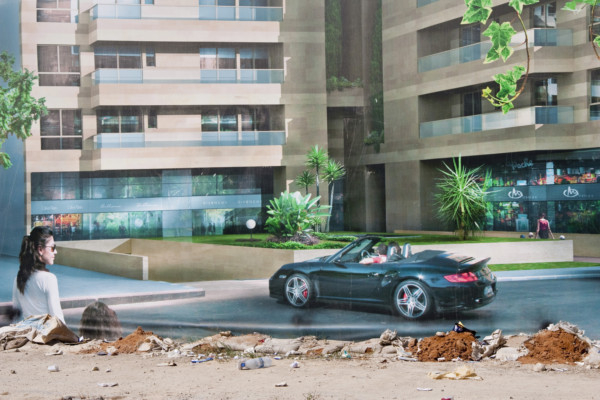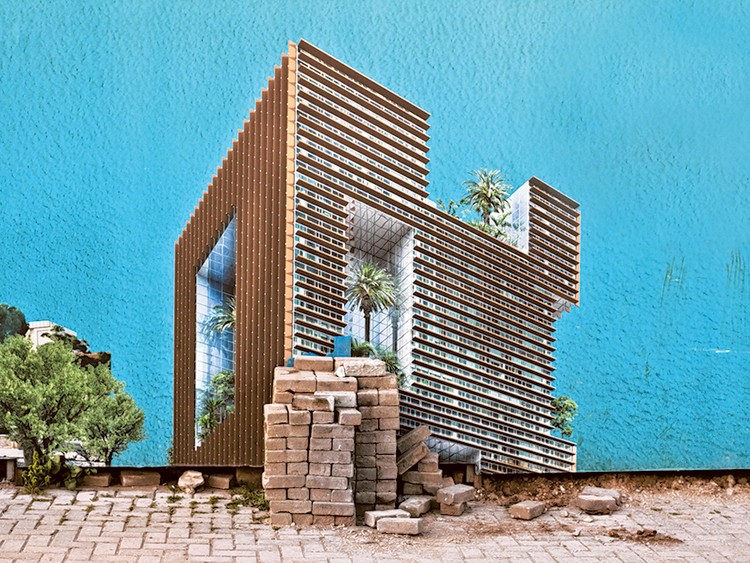
Beirut is a city where the past and the present intertwine in unpredictable and unexpected ways. While new construction projects and the rapid pace of urban development are changing the scale and character of the city, memories of the past linger on in the abandoned buildings and other visible scars of the war around the city.
The latest exhibition at Gulf Photo Plus, When Time Does Not Exist, highlights this paradoxical nature of the city and explores the Beirut that has been forgotten and the Beirut that is yet to be created.
The show features two series of photographs by award-winning photographers Stéphane Lagoutte and Randa Mirza, whose styles are different and distinct. Both artists took the present-day Beirut as a departure point for travelling backward and forward in time to create images of the city as it was in the past and the city as it aspires to be in the future.
Lagoutte is a documentary photographer based between Beirut and Paris. His work is focused on life in contemporary society, and especially on issues of identity and displacement. After winning the Hachette Foundation Prize in 2002, he began working on a long-term photography project focused on the meeting of the Maghreb and sub-Saharan Africa in Mauritania, where he photographed ordinary people in their everyday lives, highlighting their struggles and resilience. He published a photobook, Mauritania — Black Light, in 2005 and has exhibited the photographs across West Africa and Europe. He has also made a documentary on the cremation grounds on the banks of the river Ganges in Varanasi, India, and directed an exhibition in Pakistan. His images are regularly published in prestigious magazines such as Le Monde 2 and National Geographic, and have been exhibited at major photography events. He is a member of MYOP photo agency.
The series he is displaying in the show is titled Beyrouth 75-15, which tells the story of Beirut in the 1970s and in contemporary times. In this series the artist has combined his recent street photographs of Beirut as it is now, with archival photographs that he found in the rubble of a crumbling luxury hotel in the city centre. By superimposing the pre-war photographs of carefree people partying or dining at the hotel with current images of the dilapidated hotel, and new construction projects across the city, Lagoutte has brought together the past and the present to create images that are steeped in nostalgia, but also rooted in the present. His abstracted images of buildings and shadowy, ghost-like figures are a physical representation of the entanglement of the past and the present in the minds and shared memories of the Lebanese people.
“I spent three years wandering around the city, taking pictures of the people on the streets, the new flyovers and buildings under construction. I stumbled upon the pre-civil war photographic footage in the rubble near the lobby of the former Excelsior hotel, located above the nightclub Les Caves du Roy, which used to be the centre of Beirut’s nightlife in the 1950s and 1960s. By mixing those images of dancing, fun and innocence with recent pictures showing the traces of that time in the remains of the bombed hotel, and on the walls of the city, I have blended landscapes and moments of life from the past and the present. These images reflect the memory of a common history embedded in the heart of every Lebanese,” Lagoutte says.
Mirza on the other hand looks at the imagined future of the city in her ongoing series titled“Beirutopia”. The artist lives and works in Beirut and Marseille, and has won many prestigious awards, including the No Limit Award at Rencontres Internationales de la Photographie d’Arles in 2006, which recognises artists whose photography goes beyond established boundaries. She has received grants from leading arts organisations in Europe and the Arab world, and has done residencies in Finland and Venice. She has exhibited her work, including the “Beirutopia” series, in various cities. She is currently a collaborator to Zoukak and photography agency Picturetank and a committee member of Vol de Nuit.
Her photographs capture Beirut’s desire and struggle to regain a long-gone glamour, and to revive the old myth of a city that used to be known as the “Paris of the Middle East”. The most visible manifestation of this aspiration is the frenetic construction activity going on in the city and the large billboards advertising new, luxurious real estate projects. Mirza has taken photographs of the massive billboards that can be seen all over the city, while also including elements of the environment around them in the frame. She has thus created interesting juxtapositions such as an untidy stack of real bricks lying in front of a depiction of a fancy building on the billboard; or a pile of rubble seen around an upmarket apartment complex, advertised as the “sexiest” new address in town. Each photograph thus offers a projection of what is to come against the stark reality of what currently is.
“This project is a portrait of Beirut’s urban future that aims to raise questions about the ‘devenir’, or ‘the becoming’ of Beirut and its associated representations,” Mirza says.
– Jyoti Kalsi is an arts-enthusiast based in Dubai.
When Time Does Not Exist will run at Gulf Photo Plus, Alserkal Avenue, Al Quoz, until October 27.













